In-house Legal Intake vs. AI Voice Agents: Which One Fits Your Law Firm in 2025?
This comparison of AI voice agents versus traditional intake reveals a transformative opportunity for law firms in 2025. While in-house intake costs firms 10-15% of potential clients through delayed responses and requires significant staffing expenses, AI solutions deliver 24/7 availability and immediate engagement at a fraction of the cost. The data is compelling: 89% of clients prefer AI voice support, firms see 40% reduction in non-billable tasks, and implementation typically achieves ROI within 3-6 months. For forward-thinking firms of all sizes, AI voice agents offer a competitive edge in today's client-centric legal market.
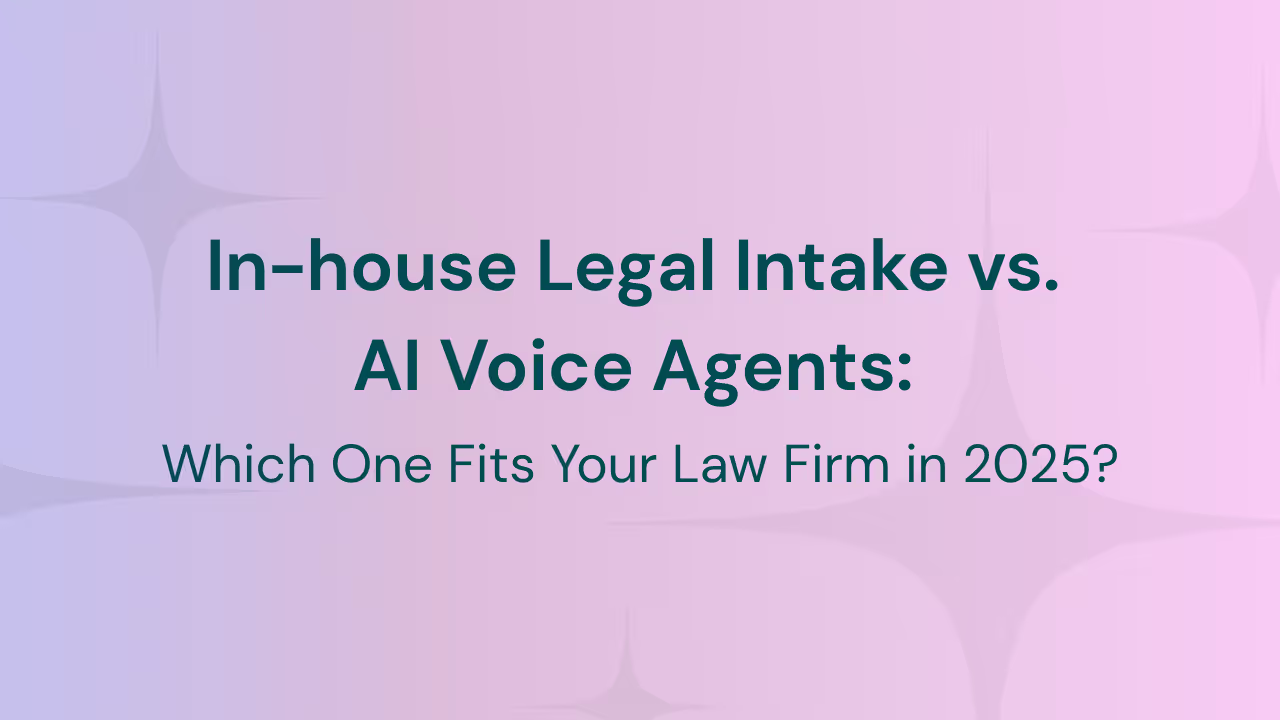
Is your law firm losing potential clients while you sleep? For small and medium-sized law firms, the answer is likely yes. Client intake—the very first touchpoint with potential clients—can make or break your firm's growth in today's competitive legal landscape. With firms losing 10-15% of potential clients due to slow response times, modernizing your intake process isn't just nice to have—it's essential for survival.
You face unique challenges: limited staff, budget constraints, and the constant pressure to compete with larger firms while maintaining personal client relationships. As clients increasingly expect instant responses and 24/7 availability, traditional intake methods are falling short. This article examines how AI voice agents for law firm intake in 2025 compare to traditional in-house methods, helping you determine which approach best suits your firm's size, practice areas, and growth goals. With 79% of legal professionals now using AI in their practice, the question isn't whether to modernize—it's how to do it right for your specific situation.
The Current State of In-house Legal Intake
Before exploring new technologies, let's examine how traditional intake processes currently function at most law firms and the challenges they present.
Key Features of In-house Legal Intake
Most law firms still rely on receptionists, paralegals, or attorneys to manually handle new client inquiries. This traditional method involves staff receiving calls, emails, or web form submissions, then collecting client information by hand. The process typically requires multiple handoffs as information moves from reception to paralegals to attorneys.
This approach works best for firms with steady client volumes and enough administrative staff. Firms with clients who value personal connections over immediate responses may also prefer this method. However, even with dedicated staff, follow-through often falls short—only 52% of salespeople make the effort to follow up with potential clients.
The human touch of in-person intake comes with significant drawbacks. Staff availability limits response times to business hours, creating gaps in service during evenings and weekends. Quality and consistency vary widely depending on which staff member handles the call.
The Hidden Costs of Traditional Intake
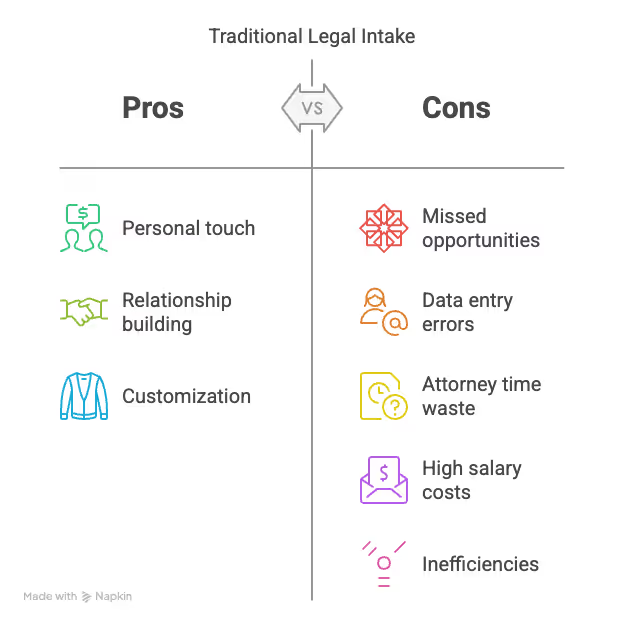
The true price of in-house legal intake goes far beyond the average $43,685 legal receptionist salary reported by 4Corner Resources. The bigger costs come from missed opportunities and inefficiencies.
Firms using traditional methods lose approximately 10-15% of potential clients due to slow response times. When potential clients reach out after hours, they often move on to competitors who respond faster.
Manual data entry introduces error rates of 5-7%, creating headaches down the road. These errors affect conflict checks, billing accuracy, and client communication.
Perhaps most expensive is the attorney time diverted to intake activities. Lawyers at firms using traditional methods spend 6-8 hours weekly on intake tasks that could be automated—thousands of dollars in lost billable time every month. This explains why law firm intake automation has become a priority for forward-thinking firms focused on profitability.
AI Voice Agents: The 2025 Approach to Legal Intake
As technology evolves, AI voice agents have emerged as a powerful alternative to traditional intake methods, offering capabilities that were unimaginable just a few years ago.
Key Features of AI Voice Agents
AI voice agents use advanced natural language processing to engage with potential clients across multiple channels. Whether clients call, text, email, or visit your website, these systems can gather information through natural conversation.
Unlike chatbots from a few years ago, today's legal client onboarding technology understands context and can ask follow-up questions based on a client's responses. They adapt their approach depending on the practice area.
These modern law firm intake systems integrate with your existing case management and billing platforms. Information collected flows automatically into your systems, eliminating double entry and reducing errors.
The 24/7 availability means no more missed opportunities during lunch breaks, after hours, or weekends. This always-on approach resonates with modern clients—89% of clients prefer AI voice-enabled support according to Verloop's research.
AI Voice Agents' Competitive Edge

"Unlike traditional intake which follows a 9-to-5 schedule, AI voice agents provide continuous client engagement," notes Emily Chen, legal technology consultant at LawTech Advisors. This immediate responsiveness increases conversion rates by 35-40% compared to firms that respond the next business day.
The efficiency gains are equally impressive. Firms implementing AI voice agents report a 40% reduction in non-billable tasks according to WePupThePhone's insights, freeing attorneys to focus on revenue-generating work.
Standardization represents another significant advantage. Many firms now consider AI voice agents essential legal practice efficiency tools that follow the same protocols for every inquiry, ensuring consistent data collection and client experience regardless of time of day or which office receives the contact. As a key component of law firm growth technology, these systems scale effortlessly as your practice expands.
In-house vs. AI Voice Agents: A Direct Comparison for 2025
Let's examine how these two approaches compare across critical factors including cost, client experience, and operational efficiency.
The Real Cost of In-house Legal Intake in 2025
Traditional in-house intake relies heavily on human resources—receptionists answering phones, paralegals processing forms, and attorneys conducting initial consultations. For a small firm, this often means one person juggling multiple tasks. For larger firms, it means an entire department.
The financial impact is substantial. A dedicated intake specialist costs $43,000+ annually, plus benefits, training, and overhead. More importantly, scaling requires hiring additional staff, creating a direct link between growth and expenses.
In-house intake also struggles with volume fluctuations. During busy periods, backlogs develop and potential clients slip through the cracks. During slow times, staff sit idle—wasted resources you're still paying for. This inefficiency makes traditional intake particularly costly for firms with irregular client flows.
The Modern Client Experience
Today's clients expect immediate engagement when seeking legal services. They're accustomed to on-demand services in every aspect of their lives and bring those expectations to legal interactions.
AI voice agents respond instantly to inquiries at any hour, creating positive first impressions that translate to higher conversion rates. The technology creates a seamless experience from first contact through consultation scheduling. For tech-savvy clients, this modern approach signals that your firm is forward-thinking and efficient.
The consistency factor shouldn't be overlooked. While human interactions vary based on mood, workload, or experience level, 30% of law firms adopted AI in 2024 (up from 11% in 2023) partly because AI voice agents deliver the same professional experience every time.
Cost and Efficiency Comparison for Different Firm Sizes
The numbers tell a compelling story. For small firms, AI voice agents cost 25% of traditional intake while offering unlimited capacity. Mid-size firms see similar advantages, with AI solutions costing roughly 15-20% of traditional approaches.
Even large firms with established intake departments benefit from significant savings—95% of firms using AI report cost/time savings according to Plivo's research. The immediate response time and after-hours coverage provide competitive advantages that translate directly to increased client acquisition.
How Firm Size Impacts Your 2025 Intake Decision
Your firm's size significantly influences which intake approach will yield the best results, with different challenges and opportunities at each scale.
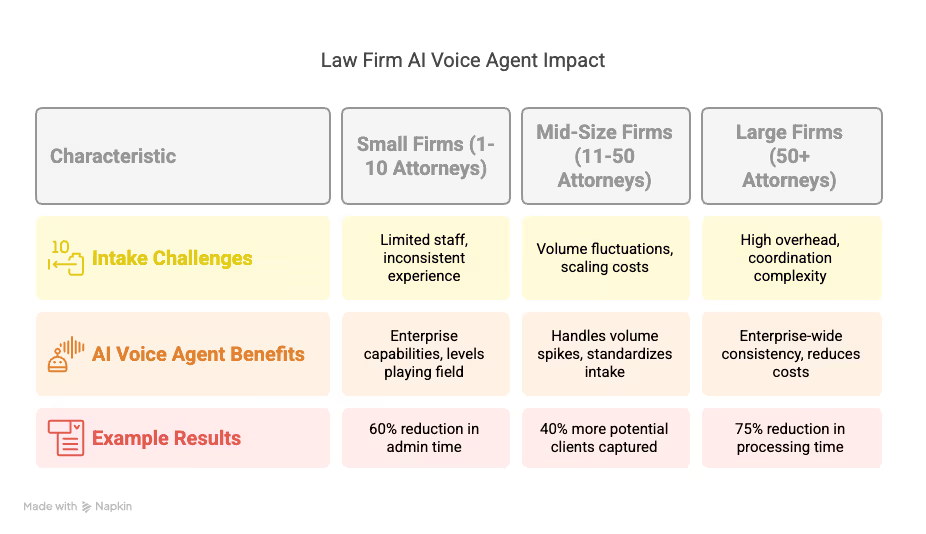
Small Firms (1-10 Attorneys)
Small firms face unique intake challenges: limited staff, no dedicated receptionist, and attorneys often handling intake themselves. This pulls lawyers away from billable work and creates inconsistent client experiences when everyone's juggling multiple responsibilities.
AI voice agents create enterprise-level capabilities without the overhead of hiring dedicated staff. The technology levels the playing field, allowing small firms to compete with larger competitors in responsiveness. 53% of small law firms use generative AI in 2025, nearly double the rate from 2023.
One example: A 5-attorney family law firm implemented AI voice agents and saw a 60% reduction in non-billable administrative time and a 28% increase in qualified consultations within three months, achieving ROI within the first quarter.
Mid-Size Firms (11-50 Attorneys)
Mid-size firms typically have dedicated intake staff but struggle with volume fluctuations and scaling costs as they grow. Finding intake specialists who understand multiple practice areas adds another layer of complexity.
Mid-size firms benefit from AI voice agents' ability to handle volume spikes without additional staffing costs. The technology standardizes intake across practice groups while allowing customization for different matter types.
Consider a 35-attorney regional firm that implemented AI voice agents to manage evening and weekend inquiries. They captured 40% more potential clients who previously contacted competitors during off-hours. Their marketing director noted, "We're getting cases that used to go to our competitors simply because we now answer the phone at 8 PM when someone's searching for a lawyer."
Large Firms (50+ Attorneys)
Large firms have established intake departments but face significant overhead costs and coordination challenges across offices and practice groups. With 1.3 million lawyers in the U.S. competing for clients, even large firms need efficiency advantages.
For large firms, AI voice agents provide enterprise-wide consistency in client experience while integrating with sophisticated practice management systems. The technology standardizes initial client interactions across locations while reducing operational costs.
An AmLaw 200 firm deployed AI voice agents as part of a digital transformation initiative, reducing intake processing time by 75% and improving data accuracy in their case management system by 35%. The firm's managing partner reported, "We've maintained the white-glove service our clients expect while dramatically improving our back-end operations."
Practice Area Considerations for Your Intake Strategy
Beyond firm size, the types of law you practice greatly influence which intake approach will best serve your clients and operational needs.
High-Volume Practice Areas
Practice areas like personal injury, family law, and residential real estate typically manage high volumes of similar matters. These areas have fairly standard intake questions and qualification criteria, making them ideal for automation.
Modern law firm intake systems excel in high-volume practices by handling routine qualification questions while adapting to case-specific details. For example, a personal injury AI voice agent can gather accident details, insurance information, and medical treatment history—then immediately schedule qualified clients for attorney consultations.
A real estate practice in Florida implemented AI voice agents to manage their high volume of transaction inquiries. Within two months, their consultation scheduling rate increased by 45% while reducing the administrative burden on their paralegals by over 50%.
Complex/Specialized Practice Areas
Practices like corporate transactions, complex litigation, and specialized regulatory work often require nuanced initial conversations. However, even these areas benefit from partial automation.
For complex practices, AI voice agents can handle initial screening, gather preliminary information, and schedule appropriate attorney consultations, while flagging matters requiring immediate attorney attention. This hybrid approach maintains the specialized expertise clients expect while improving overall efficiency.
A boutique intellectual property firm uses AI voice agents to conduct initial patent consultation screening. The system gathers invention details, prior art information, and commercialization plans before routing qualified matters to the appropriate patent attorney based on technical expertise.
Case Study: How a Multi-Practice Firm Transformed with AI Voice Agents
To illustrate these principles in action, let's examine how one diverse firm successfully implemented AI voice agents to address their specific challenges.
A 40-attorney firm with seven practice areas struggled with inconsistent intake processes across departments. Each practice group had developed its own intake methods, creating data silos and confusion for staff handling calls for multiple departments. The firm's managing partner described their previous intake system as "a patchwork of sticky notes, emails, and voice messages" that resulted in delayed follow-ups and lost opportunities.
After evaluating several options, the firm implemented AI voice agents with practice-specific conversation flows, integrated with their existing practice management and CRM systems. They started with their highest-volume practice areas—personal injury and family law—before expanding firm-wide.
The results were remarkable: 45% reduction in intake processing time, 30% increase in qualified consultations, and standardized data collection across all practice areas. Attorneys reported saving 5-7 hours weekly on administrative tasks, translating to over $800,000 in additional annual billable time.
"The consistency has been the biggest surprise benefit," notes the firm's operations director. "Every client gets the same professional experience regardless of which practice area they're contacting or when they call. That wasn't possible with our previous human-only approach."
Implementation Roadmap: Transitioning to AI Voice Agents
For firms considering the switch to AI voice agents, a structured implementation approach maximizes success and minimizes disruption.
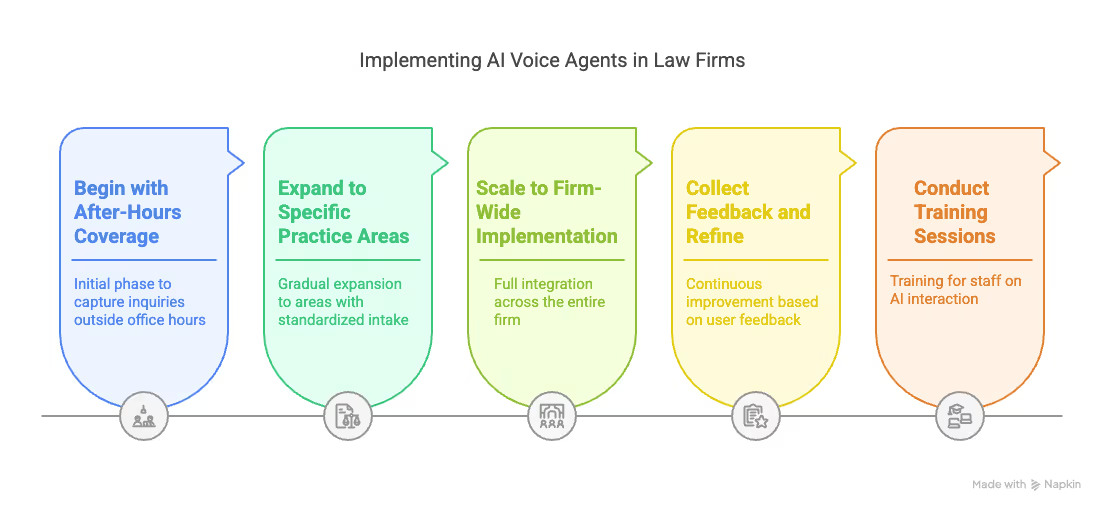
Assessing Your Firm's Readiness
Before implementing AI voice agents for law firm intake in 2025, evaluate your current process metrics. Track response times, conversion rates from inquiry to consultation, and staff time spent on intake tasks. Identify specific pain points—after-hours coverage gaps, inconsistent information gathering, or integration issues between systems.
Technology infrastructure matters too. Most AI voice agents integrate with popular legal practice management systems like Clio, Rocket Matter, and Practice Panther. Make a list of your current systems and check compatibility with potential AI solutions.
Don't overlook the human factor. Survey attorneys and staff about current intake challenges and gather client feedback about their initial experience. Use this data to build an implementation strategy that addresses actual problems rather than assumed ones.
A readiness assessment should also examine your firm's marketing channels. Firms with strong online presence typically see faster returns from AI implementation since digital-first clients are already comfortable with technology-driven interactions.
Phased Implementation Approach
Most successful firms implement AI voice agents in phases rather than making an immediate complete transition. This gradual approach minimizes disruption and allows for optimization at each stage.
Begin with after-hours coverage when no staff are available. This creates immediate value by capturing inquiries that would otherwise go to voicemail. Next, expand to specific practice areas with standardized intake requirements, like personal injury or estate planning.
As attorneys and staff adapt to the new workflow, gradually scale to firm-wide implementation. Throughout this process, collect feedback and refine the AI's conversation flows to better match your specific practice needs.
The technology partner you choose should offer training sessions for your team. Schedule these trainings for different groups based on how they'll interact with the system. Receptionists need detailed understanding of how to monitor and supplement the AI, while attorneys may need briefer overviews of how qualified leads are routed to them.
Conclusion: Making the Right Choice for Your Firm in 2025
The decision between traditional intake and AI voice agents isn't either/or—it's about finding the right balance for your firm. As client expectations evolve toward immediate, 24/7 service, modernizing your intake process has become essential for growth and competitiveness.
AI voice agents deliver what today's legal consumers demand: instant response, consistent experience, and efficient service—all while freeing your attorneys to focus on billable work. The technology creates enterprise-level capabilities for firms of all sizes at a fraction of traditional costs.
Ready to transform your intake process? Legal Clerk AI offers a customized solution tailored to your firm's specific practice areas and workflow. Our platform integrates seamlessly with your existing systems and can be implemented in phases to ensure smooth adoption.
Take the first step toward modernizing your client acquisition strategy. Schedule a free consultation today to discover how Legal Clerk AI can help your firm capture more qualified clients while reducing administrative burden.
FAQs About Legal Intake Options in 2025
As you consider which intake approach best fits your firm, here are answers to the most common questions we receive from legal professionals.
Q: How do AI voice agents handle attorney-client privilege concerns?
A: AI voice agents are designed with legal-specific security protocols and can be configured to collect only non-privileged information during initial intake. The systems comply with relevant data protection regulations and firm confidentiality requirements. For sensitive matters, the AI can be programmed to immediately transfer potential clients to attorneys after minimal screening.
Q: Do clients react negatively to AI intake systems?
A: Recent studies show that 78% of legal clients in 2025 prefer immediate engagement with a sophisticated AI system over waiting for human response. The technology has advanced to create natural conversations that maintain a professional tone aligned with your firm's approach. Most clients don't even realize they're interacting with AI unless you specifically inform them.
Q: How do AI voice agents integrate with our existing technology stack?
A: Modern AI voice agents offer pre-built integrations with major legal practice management systems, CRMs, and billing platforms. Custom APIs are available for specialized systems, typically requiring 2-4 weeks for implementation. Many vendors provide technical support teams to manage integration, minimizing the burden on your IT resources.
Q: What happens when the AI encounters unusual situations?
A: AI voice agents can be programmed with escalation protocols that route complex or unusual situations to appropriate human staff. The system continuously learns from these exceptions, improving its handling of edge cases over time. You can define specific trigger phrases or question types that automatically transfer to human staff.
Q: How long does it take to see ROI from implementing AI voice agents?
A: Most firms report achieving ROI within 3-6 months. Small firms typically see faster returns due to the immediate impact on attorney time allocation, while larger firms may take longer to achieve full-scale implementation benefits. The ROI calculation should include both direct cost savings and revenue increases from improved client conversion rates.
Recent Blogs
FAQs: Everything You’re Wondering About Your AI Receptionist
Absolutely. Whether you need a full-time law firm answering service or just support during off-hours, LegalClerk adjusts to your needs. You control when the AI receptionist picks up.
Yes. LegalClerk is built specifically for law firms. It knows how to handle legal intake questions, understands terminology by practice area, and never misses a required field or form detail.
Yes. Our AI legal receptionist uses advanced natural language processing and human-like voice tech to deliver a warm, responsive client experience. Most callers can’t tell it is AI — and that’s by design.
Yes. LegalClerk connects with tools like Clio, Lawmatics, Google Calendar, Calendly, and more. New leads, appointments, and intake summaries are automatically synced.
Yes. LegalClerk offers multilingual legal receptionist support, allowing you to serve a broader range of clients with accurate, translated intake flows.
Completely. LegalClerk uses HIPAA-grade encryption, secure storage, and detailed access logging. Every call and submission is protected and fully auditable.

.avif)
3.jpg)

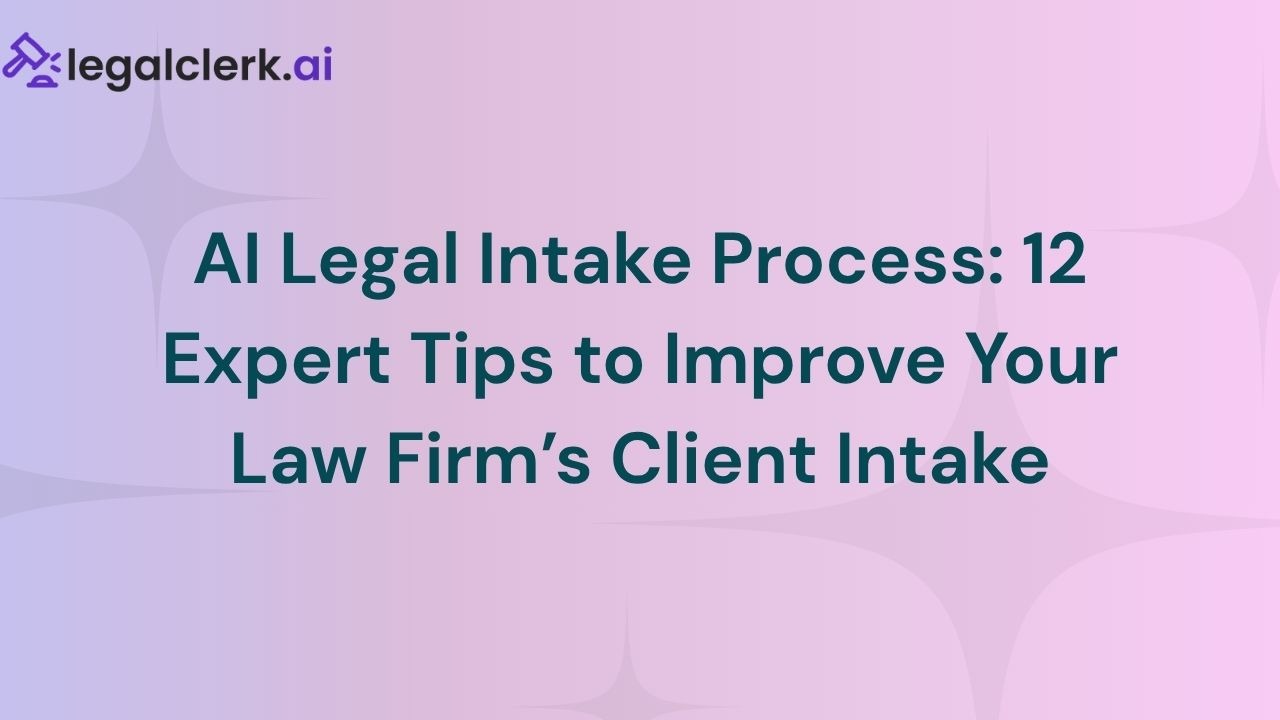
.jpg)